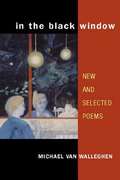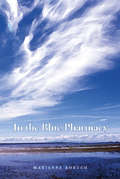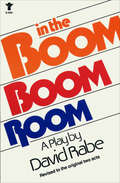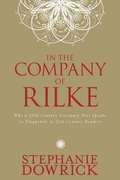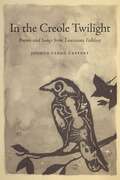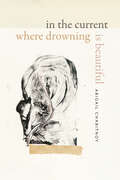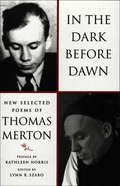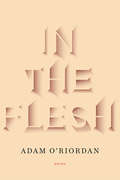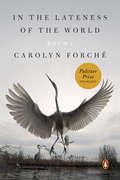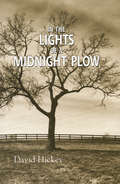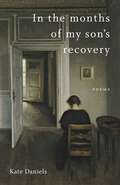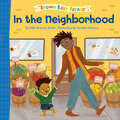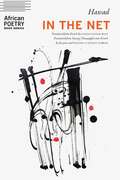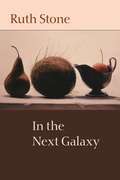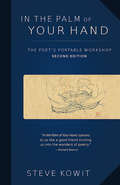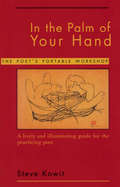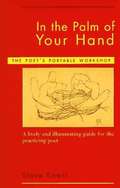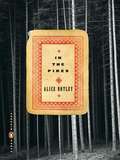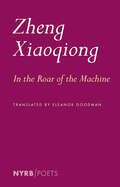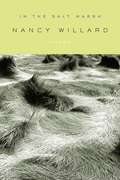- Table View
- List View
In the Black Window: NEW AND SELECTED POEMS
by Michael Van WalleghenThe title of Michael Van Walleghen's new collection evokes thematic preoccupations that have shadowed him throughout his long career. Appearing as a phrase in the poems themselves, In the Black Window more generally points to Van Walleghen's enduring interest in the intersection between inner and outer worlds of experience--those liminal moments in other worlds where we become aware of ourselves. We live at once in a strictly personal, material dimension but also in a distinctly spiritual one. Yet, when looking from a lighted kitchen into a night-black window on a winter evening, we might perhaps become suddenly aware not only of our own reflection, but also of our complicity in some deeper mystery altogether.
In the Blue Pharmacy
by Marianne BoruchCollected here are sixteen essays on poets and poetry, the writing life, and a host of fascinating topics that come into the wide range of Marianne Boruch's attention. She examines how the imagination works with mystery and surprise in a variety of poets from Elizabeth Bishop to Theodore Roethke, from Russell Edson to Larry Levis, from Walt Whitman to Eavan Boland. Combining a richly associative personal style with original insights on poetic texts and historical and cultural musing, Boruch considers how the atomic bomb changed William Carlos Williams's deepest ambition for poetry, and how Edison's listening, through his famous deafness, informs our sense of the poetic line. Other essays explore how the car-its danger and solitude-helps us understand American poetry or how Dvorak and Whitman shared darker things than their curious love for trains. Poetry transforms, changing over time in the work of individual poets as well as changing us as we read it or write it.Boruch's writing has a musical, incantatory style, creating a mood in which many of her subjects are immersed. Her approach isn't meant to fix or crystallize her ideas in any hard and fast light, but rather to present the music of her thinking.
In the Blue Pharmacy
by Marianne BoruchCollected here are sixteen essays on poets and poetry, the writing life, and a host of fascinating topics that come into the wide range of Marianne Boruch's attention. She examines how the imagination works with mystery and surprise in a variety of poets from Elizabeth Bishop to Theodore Roethke, from Russell Edson to Larry Levis, from Walt Whitman to Eavan Boland. Combining a richly associative personal style with original insights on poetic texts and historical and cultural musing, Boruch considers how the atomic bomb changed William Carlos Williams's deepest ambition for poetry, and how Edison's listening, through his famous deafness, informs our sense of the poetic line. Other essays explore how the car-its danger and solitude-helps us understand American poetry or how Dvorak and Whitman shared darker things than their curious love for trains. Poetry transforms, changing over time in the work of individual poets as well as changing us as we read it or write it.Boruch's writing has a musical, incantatory style, creating a mood in which many of her subjects are immersed. Her approach isn't meant to fix or crystallize her ideas in any hard and fast light, but rather to present the music of her thinking.
In the Boom Boom Room: A Play (Rabe, David Ser.)
by David RabeThis extensively revised version of David Rabe's 1973 play returns it to the two-act structure originally intended by the author, as it sharpens and focuses his searing portrait of a young dancer's descent into hell.
In the Company of Rilke
by Stephanie DowrickIn the Company of Rilke is a rare book about a rare poet. Rainer Maria Rilke was a giant of twentieth-century writing who remains a visionary voice for our own time, captivating readers not only with his brilliance but also his fearlessness about the "deepest things. " Speaking through his own contradictions and ambivalence, he offers readers a profound understanding of the complex beauty and depth of human existence. Here, as in Rilke's own writing, questions matter more than answers. Here, a poet can speak directly to God while also doubting God. Astonishingly, this is the first major study of Rilke from a spiritual perspective, even though the greatest of Rilke' s gifts was to show how inevitably life centres upon a profound mystery-to which we can freely open ourselves. Drawing on her deep understanding of the gifts of Rilke's writings, as well as her own personal spiritual seeking, Dr Stephanie Dowrick offers an intimate and accessible appreciation of this most exceptional poet and his transcendent work.
In the Creole Twilight: Poems and Songs from Louisiana Folklore
by Joshua Clegg CafferyMany of the recurring motifs found in south Louisiana's culture spring from the state's rich folklore. Influenced by settlers of European and African heritage, celebrated customs like the Courir de Mardi Gras and fabled creatures like the Loup-Garou grow out of the region's distinctive oral tradition. Joshua Clegg Caffery's In the Creole Twilight draws from this vibrant and diverse legacy to create an accessible reimagining of the state's traditional storytelling and songs.A scholar and Grammy-nominated musician, Caffery borrows from the syllabic structures, rhyme schemes, narratives, and settings that characterize Louisiana songs and tales to create new verse that is both well-researched and refreshingly inventive. Paired with original pen-and-ink illustrations as well as notes that clarify the origins of characters and themes, Caffery's compositions provide a link to the old worlds of southern Louisiana while constructing an entirely new one.
In the Current Where Drowning Is Beautiful (Wesleyan Poetry Series)
by Abigail ChabitnoyIn the Current Where Drowning Is Beautiful is a meditation on water, land, women, and violent environmental changes as they affect both the natural world and human migration. The poet reckons with the unsettling realities that women experience, questioning the cause and effect of events and asking why stories of oppression are so often simply accepted as the only stories. Alutiiq language is used throughout these poems that are in conversation with history, ancestors, and an uncertain future, in imagery that moves in waves, returning again and again to the ocean, and a deep visioning of the "current."Excerpt from IN THE FIELD They asked me if I was a citizen. They wanted to know what I had seen/I had heard/this was only a test: Look at the mark and tell them what you see.[...]
In the Dark Before Dawn: New Selected Poems
by Kathleen Norris Thomas Merton Lynn R. SzaboA new, broad, comprehensive view of the innovative poetry of the late, great Trappist monk and religious philosopher Thomas Merton. Poet, Trappist monk, religious philosopher, translator, social criticthe late Thomas Merton was all these things. Until now, no selection from his great body of poetry has afforded a comprehensive view of his varied and largely innovative work. In the Dark Before Dawn: New Selected Poems of Thomas Merton is not only double the size of Merton's earlier Selected Poems (1967), it also arranges his poetry thematically and chronologically, so that readers can follow the poet's multifarious interrelated lines of thought as well as his poetic development over the decades, from his college days in the 1930s to his untimely accidental death in Bangkok in 1968 during his personal Eastern pilgrimage. The selections are grouped under eight thematic headings"Geography's Landscapes," "Poems from the Monastery," "Poems of the Sacred," "Songs of Contemplation," "History's Voices: Past and Present," "Engaging the World," "On Being Human," "Merton and Other Languages."
In the Flesh: Poems
by Adam O'Riordan“Precise and attentive. O’Riordan has the painter’s eye for detail and the pianist’s touch for sounding the right notes.”—Simon Armitage This startling debut from a young British poet traces the paths from past to present, the lost to the living, seeking familiarity in a world of “false trails and disappearing acts.” Here, relatives, friends, and other absences are coaxed into life and urgently pressed on the reader as they surface, in the flesh. At the heart of the collection lies the sonnet sequence “Home,” a slant look at the lives of William and Dorothy Wordsworth, intersected by more recent, sometimes unsettling, personal portraits. Clear-eyed and sensuous, these are poems linked by a strong sense of place and presence, of history captured in an irrevocable moment.
In the Lateness of the World: Poems
by Carolyn Forché&“An undisputed literary event.&” — NPRA new poetry collection of uncanny grace and moral force from one of our country's most celebrated poetsOver four decades, Carolyn Forché's visionary work has reinvigorated poetry's power to awaken the reader. Her groundbreaking poems have been testimonies, inquiries, and wonderments. They daringly map a territory where poetry asserts our inexhaustible responsibility to each other. Her first new collection in seventeen years, In the Lateness of the World is a tenebrous book of crossings, of migrations across oceans and borders but also between the present and the past, life and death. The poems call to the reader from the end of the world where they are sifting through the aftermath of history. Forché envisions a place where "you could see everything at once ... every moment you have lived or place you have been." The world here seems to be steadily vanishing, but in the moments before the uncertain end, an illumination arrives and "there is nothing that cannot be seen." In the Lateness of the World is a revelation from one of the finest poets writing today.
In the Lights of a Midnight Plow
by David HickeyIn the Lights of a Midnight Plow, glitters and startles. The writing is deftly musical, where every detail and image has been carefully weighed, honed with a knife's edge and poet's ear. There is language, the sparkle and sheen of it, the rhythm, all of which tells us that a new and important voice is at work here.
In the Months of My Son's Recovery: Poems (Southern Messenger Poets)
by Kate DanielsThe poems of In the Months of My Son’s Recovery inhabit the voice and point of view of the mother of a heroin addict who enters recovery. With clear perception and precise emotional tones, Kate Daniels explores recovery experiences from multiple, evolving vantage points, including active addiction, 12-step treatment, co-occurring mental illness and addiction (known as dual diagnosis), and relapse. These intimately voiced, harrowing poems reveal the collateral damage that addiction inflicts on friends and families, in addition to the primary damage sustained by addicts themselves. Offering bold descriptions of medical processes, maternal love, and the potential for hope as an antidote to despair, this timely collection offers a firsthand account of the many crises at the heart of the opioid epidemic.
In the Name of Salome
by Julia AlvarezTold from two points of view, this novel is the story of Salome Urefia, the national poet of the Dominican Republic, and of her daughter Camila, who becomes a professor at Vassar College. The narrative shifts between their storylines and viewpoints. This is a beautifully written book with compelling characters and a vivid sense of history.
In the Neighborhood: A Brown Baby Parade Book (Brown Baby Parade)
by Nikki Shannon SmithBaby and Daddy are taking a walk in their neighborhood! Read along as they say hello to their friends and celebrate their community in this next installment of the Brown Baby Parade series that's perfect for ages 0-3.Baby&’s home with Daddy.He wants to take a walk.They have friendly neighbors,who like to wave and talk.The neighborhood is bustling with friends who are planting, playing baseball, blowing bubbles, and more! Read along as Baby and Daddy say hi to them all!Nikki Shannon Smith's soothing, rhythmic text and Tamisha Anthony's warm, welcoming illustrations pair beautifully to create heartwarming scenes of everyday life. The joyful depiction of a diverse community will allow children to see themselves and encourage them to interact with their own neighborhood!
In the Net (African Poetry Book)
by Mahmoudan HawadIn the face of amnesia, how does one exist? In this poem, Hawad speaks directly to Azawad, a silent figure whose name designates a portion of Tuareg lands divided among five nation-states created in the 1960s. This evanescent being, situated on the edge of the abyss and deprived of speech, space, and the right to exist, has reached such a stage of suffering, misery, and oppression that it acquiesces to the erasure implicit in the labels attached to it. Through an avalanche of words, sounds, and gestures, Hawad attempts to free this creature from the net that ensnares it, to patch together a silhouette that is capable of standing up again, to transform pain into a breeding ground for resistance—a resistance requiring a return to the self, the imagination, and ways of thinking about the world differently. The road will be long. Hawad uses poetry, &“cartridges of old words, / a thousand and one misfires, botched, reloaded,&” as a weapon of resistance.
In the Next Galaxy
by Ruth StoneRuth Stone writes with crackling intelligence from the vantage point of an aging and impoverished woman. Wise, sardonic, crafty, and misleadingly simple, Stone loves heavy themes but loathes heavy poems.<P><P> Winner of the National Book Award
In the Palm of Your Hand, Second Edition: A Poet's Portable Workshop
by Steve Kowit*Over 90,000 copies sold* Long an anchor text for college and junior college writing classes, this illuminating and invaluable guide has become a favorite for beginning poets and an ever-valuable reference for more advanced students who want to sharpen their craft, expand their technical skills, and engage their deepest memories and concerns.This edition adds Steve Kowit’s famous essay on poetics “The Mystique of the Difficult Poem,” in which he argues stirringly and forcefully that a poem need not be obscure to be great. Ideal for teachers who have been searching for a way to inspire students with a love for writing--and reading--contemporary poetry. It is a book about shaping your memories and passions, your pleasures, obsessions, dreams, secrets, and sorrows into the poems you have always wanted to write. If you long to create poetry that is magical and moving, this is the book you've been looking for. Here are chapters on the language and music of poetry, the art of revision, traditional and experimental techniques, and how to get your poetry started, perfected, and published. Not the least of the book's pleasures are model poems by many of the best contemporary poets, illuminating craft discussions, and the author's detailed suggestions for writing dozens of poems about your deepest and most passionate concerns.
In the Palm of Your Hand: A Poet's Portable Workshop
by Steve KowitAn illuminating and invaluable guide for beginners wary of modern poetry, as well as for more advanced students who want to sharpen their craft and write poems that expand their technical skills, excite their imaginations, and engage their deepest memories and concerns. Ideal for teachers who have been searching for a way to inspire students with a love for writing--and reading--contemporary poetry. It is a book about shaping your memories and passions, your pleasures, obsessions, dreams, secrets, and sorrows into the poems you have always wanted to write. If you long to create poetry that is magical and moving, this is the book you've been looking for. Here are chapters on the language and music of poetry, the art of revision, traditional and experimental techniques, and how to get your poetry started, perfected, and published. Not the least of the book's pleasures are model poems by many of the best contemporary poets, illuminating craft discussions, and the author's detailed suggestions for writing dozens of poems about your deepest and most passionate concerns.
In the Pines
by Alice NotleyA bold and strikingly original new work from one of America's greatest living poets Alice Notley is considered by many to be among the most outstanding of living American poets. Notley's work has always been highly narrative, and her new book mixes short lyrics with long, expansive lines of poetry that often take the form of prose sentences, in an effort "to change writing completely. " The title piece, a folksong-like lament, makes a unified tale out of many stories of many people; the middle section, "The Black Trailor," is a compilation of noir fictions and reflections; while the shorter poems of "Hemostatic" range from tough lyrics to sung dramas. Full of curative power, music, and the possibility of transformation, In the Pines is a genre- bending book from one of our most innovative writers. .
In the Pines
by Alice NotleyA bold and strikingly original new work from one of America's greatest living poets Alice Notley is considered by many to be among the most outstanding of living American poets. Notley's work has always been highly narrative, and her new book mixes short lyrics with long, expansive lines of poetry that often take the form of prose sentences, in an effort "to change writing completely." The title piece, a folksong-like lament, makes a unified tale out of many stories of many people; the middle section, "The Black Trailor," is a compilation of noir fictions and reflections; while the shorter poems of "Hemostatic" range from tough lyrics to sung dramas. Full of curative power, music, and the possibility of transformation, In the Pines is a genre- bending book from one of our most innovative writers.
In the Presence of the Sun: Stories and Poems
by N. Scott MomadayThe author's stories and poems that represent the American heritages and cultures of the past.
In the Roar of the Machine
by Zheng XiaoqiongPoems about life in the Chinese factories by a brilliant and passionate poet and workers&’ rights activist. This collection shines light on the human toll behind the production of cheap goods, all set in the context of classical Chinese literature, the natural environment of southern China, and the voices of the poet's own ancestors.Zheng Xiaoqiong is one of the most significant living Chinese poets whose unique poetics brings to the fore the plight of factory workers, women, and the rural poor in contemporary China, while situating these sociological concerns within a larger context that includes classical Chinese poetry, the voices of Zheng&’s ancestors, the natural environment of southern China, and her native Huangma Mountains in central Sichuan.Zheng spent nearly a decade working in the factories and warehouses of Guangdong province, one of the largest manufacturing centers in the world. Her poems give voice to the global economy&’s human toll: the twelve-hour days on the assembly line, the endless mechanical din, the injuries and drudgery, the homesick murmur of far-flung dialects in the dorms.Zheng is an advocate for worker&’s and women&’s rights, but what counters the roar of the machines in her poetry is the tenderness of her attention: &“we / live, the nearby crowds that come and go / they live in my poetry, on paper, immense / yet frail, the tiny voices of these sentences / these fragile hearts.&”
In the Salt Marsh: Poems
by Nancy WillardIn this strong, appealing collection, Nancy Willard shares her passion for observing the mysteries of the natural world, particularly the flora and fauna of Cape Cod and the Hudson Valley, where many of these poems are set. We see, through her eyes, the coming of darkness to an empty orchard, the retreat of deer at dusk, and the breakup of a river with the onset of spring. Willard is also deeply engaged with the living creatures that populate her world. Her poems record her encounter with a moon snail and her celebration of the ladybugs she sends into the garden and the butterflies that alight on her shoulders like ghostly kisses. Amid poems about the intimate presence of nature are expressions of absences deeply felt. Willard is drawn not just to the inhabited world but also to the empty spaces with which our passage through life is strewn. In “The Absence at the Swing,” a rabbit watches a swing’s back-and-forth motion just after the children have left the playground; in “Niche Without Statue,” she takes us to “an alcove scoured / to stucco light” and tells us, “Somebody lived here. Stepped away. No tracks. ” We learn, too, of the presences she misses most deeply, as in “Phone Poem,” in which she imagines receiving a telephone call from her father after his death. Whether she is cultivating a sense of the life that is all around her or attending to the losses felt within, Nancy Willard never ceases to enchant us with the sense of dedication and awe that graces her verse. From the Hardcover edition.
